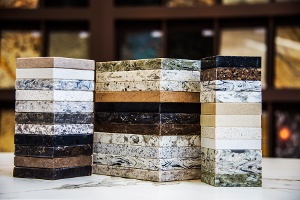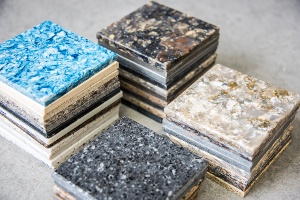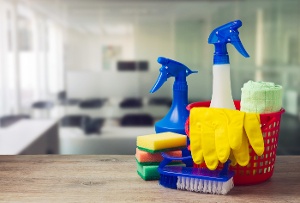Solid surface countertops are a human-made, durable choice seen in manufacturing industry labs everywhere for a reason. It's no wonder lab managers and employees love them.
From their non-porous and easily repairable features to the wide variety of aesthetically-pleasing options available, solid surface countertops are practical and attractive.
If you’re exploring new countertop surface options for your lab workstations, here are four things to know about solid surface countertops material before you settle on this popular and versatile option:
- Solid surface countertops material is homogeneous.
- Solid surface countertops material holds up well to moisture.
- Solid surface can be customized.
- Solid surface material is easy to maintain and repair.
Solid Surface Countertops Material Is Homogeneous
Solid surface countertops contain a non-porous, homogeneous material that consists of the same composition throughout. A solid surface is similar to plastic in that it is usually made from resin and features a filler material. The end result is around 66% minerals and 33% binding resins.
throughout. A solid surface is similar to plastic in that it is usually made from resin and features a filler material. The end result is around 66% minerals and 33% binding resins.
Resin materials can vary from acrylic to polyester and plastic. The mineral portion often depends on what the client envisions for the countertop’s final look. Minerals may include marble and granite that give the countertop a high-end appearance.
The mineral portion also typically includes aluminum trihydrate (ath). This is a fine white powder that gives solid surface countertops their smooth appearance.
Because of this homogeneous mixture, solid surface material can cover long and large areas without the need for multiple pieces. This creates a more continuous aesthetic across one lab counter.
Solid Surface Material Holds Up Well To Moisture
One of the reasons you may be considering solid surface countertops is its ability to withstand some harsh lab conditions. In industrial or laboratory settings where moisture is present, solid surface can be an excellent choice. Because the material is water-proof and non-porous, placing this type of countertop adjacent to sinks is a logical solution.
However, solid surface cannot withstand all lab conditions, so it’s important to evaluate the chemicals used in your lab to determine if this material is the right choice.
Solid surface countertops material works well in labs that need or want:
- Water, stain, bacteria and mold resistance
- Durability against casual scratches, nicks and bangs
- Easy maintenance and cleanup
- Repairable if the material experiences minor damages
On the other hand, solid surface countertops material isn't great for labs that:
- Use harsh chemicals
- Require high heat resistance
Additionally, those who would feel upset about any little scratch and know their lab is likely to experience that event, may not prefer this material. If someone drags heavy equipment across it or hits it with a sharp or heavy tool, it can knick, crack, or scrape. In some labs, these occurrences are inevitable. But most can be repaired by you and don't usually require professional service.
That leads us to the next thing you need to know about solid surface countertops material.
Solid Surface Can Be Customized
Unlike natural stone countertop materials where the colors and patterns depend on the slab you choose, solid surface material gives you many customization options. This makes it perfect for a lab manager that needs (or prefers) a uniform look across workstations.
Colors
During the manufacturing process, adding pigments can transform a countertop into a colorful feature of your lab. You can even choose a surface that matches your branding colors. This color can be homogenous or mixed into appealing patterns.
lab. You can even choose a surface that matches your branding colors. This color can be homogenous or mixed into appealing patterns.
Are you considering a bold orange, a mellow gray, or an earth-inspired green tone? If you choose solid surface, we can configure the countertops to match your inspiration.
Just about any color can be incorporated into your solid surface countertop, from bold oranges to earth-inspired tones that draw inspiration from natural elements like seagrass and gray pearls.
Even sleek white solid surface countertops are enjoying a surge in popularity since they offer a pristine look. While you may be tempted to choose a darker color to hide stains, solid surface countertops are water-proof, offering excellent protection against stains.
Natural Stone And Marble
Solid surface countertops can incorporate the inviting, calming and invigorating look of natural stones and marble.
Granite, marble and quartz countertops can be expensive options and don’t provide a seamless look when spread out over large surfaces. These materials can also be expensive to repair because of their hardness.
With the ability to customize resin materials, customers have a vast array of choices that include many of the same patterns seen on wood, rocks and minerals. Alternating bands and grains of colors create looks that are inspired by some of the planet’s most beautiful and natural elements.
Edging
If you've never looked very closely at countertop edges, you may not realize that you have over one dozen edging options from which to choose.
From the Bevel to Ogee to the Bullnose, edging selection adds depth and class to a solid surface and reduces the appearance and chance of damage.
Finishes And Glosses
Manufacturers can add special finishes like gel coating, gloss and matte to give the countertop a unique, finished look.
Glossy finishes reflect a great deal of light. This offers a room a shiny, sleek look and can give a solid color a boost of radiance.
Important note about glossy finishes: Glossy finishes can be more difficult to maintain. If your workspace regularly houses equipment that can scratch countertops, this might not be the best finish since glossy finishes are more prone to showing scratches. If scratches do occur, it is best to seek professional help from repair companies that will use sanders and low-speed polishers to repair the surface and create a new uniform high-gloss finish.
Matte and semi-gloss finishes are less prone to scratching and are easy to clean. Although solid surface countertops are less prone to stains, if one does occur, they can be corrected by simply using cleaners. For example, to remove brown stains, you can use cleaners made with oxalic acid. For stains from dyes and vinegar, you can use a damp cloth and a small amount of mild abrasive cleaner.
Which finish you choose may depend on what color you have selected or where the countertop is going to be installed. Lighter colors typically feature matte finishes, whereas dark colors have a semi-gloss or glossy finish. Typically, areas around the sink that are high-use will feature a matte finish.
Solid Surface Material Is Easy To Clean And Repair
To clean solid surface counters, mild soap and water are often adequate. For more deep cleaning, dampen a towel with water and use ammonia-based cleaners. This can remove most stains. You can also use oxalic acid on brown stains. For stains caused by dyes and vinegar, use a water-dampened cloth with a mild abrasive cleaner.
towel with water and use ammonia-based cleaners. This can remove most stains. You can also use oxalic acid on brown stains. For stains caused by dyes and vinegar, use a water-dampened cloth with a mild abrasive cleaner.
Overall, solid surface material is easy to repair. In fact, employees can often perform most repairs. The easiest repairs involve simply using a mild abrasive cleaner to "buff" out a scratch.
Mid-range repairs may take more care, but can often be done by staff as well. For example, if the solid surface develops a crack more than six inches, manufacturers often recommend chilling the crack with an ice pack. Clean the break with a bristle brush (like a toothbrush) dipped in hydrogen peroxide. Heat the crack and then fill it with a solid surface repairing epoxy. Sand the surface, and you're done. It’s important to check with your manufacturer before making more extensive repairs to ensure your procedure is correct.
Some finishes, such as high gloss, will need professional repair to return to their original look. Repair companies will typically use special tools like orbital sanders and low-speed polishers to repair the surface and create a new uniform high-gloss finish.
How A Solid Surface Countertop Material Manufacturer Can Help
Whether you have questions about how to repair your countertop or want to know what options you have to customize the perfect piece for your lab, an experienced industrial lab furniture manufacturer can help.
When designing your solid surface countertops, it’s important to work with an experienced manufacturer or supplier that can advise you on whether this material is right for your lab and what options are available to you.
Purchasing a countertop is a significant investment. The best manufacturers will work with you to design a surface that meets your needs and provides you with the look you want for your lab.


